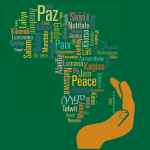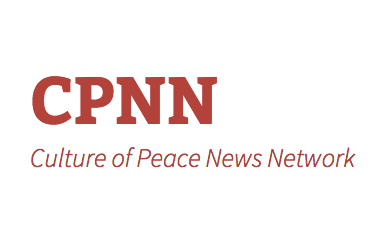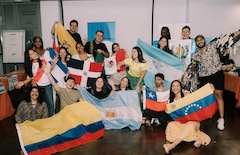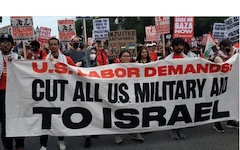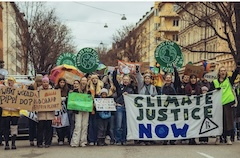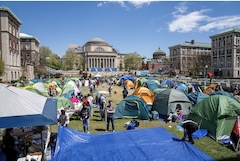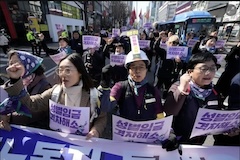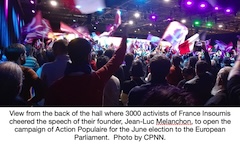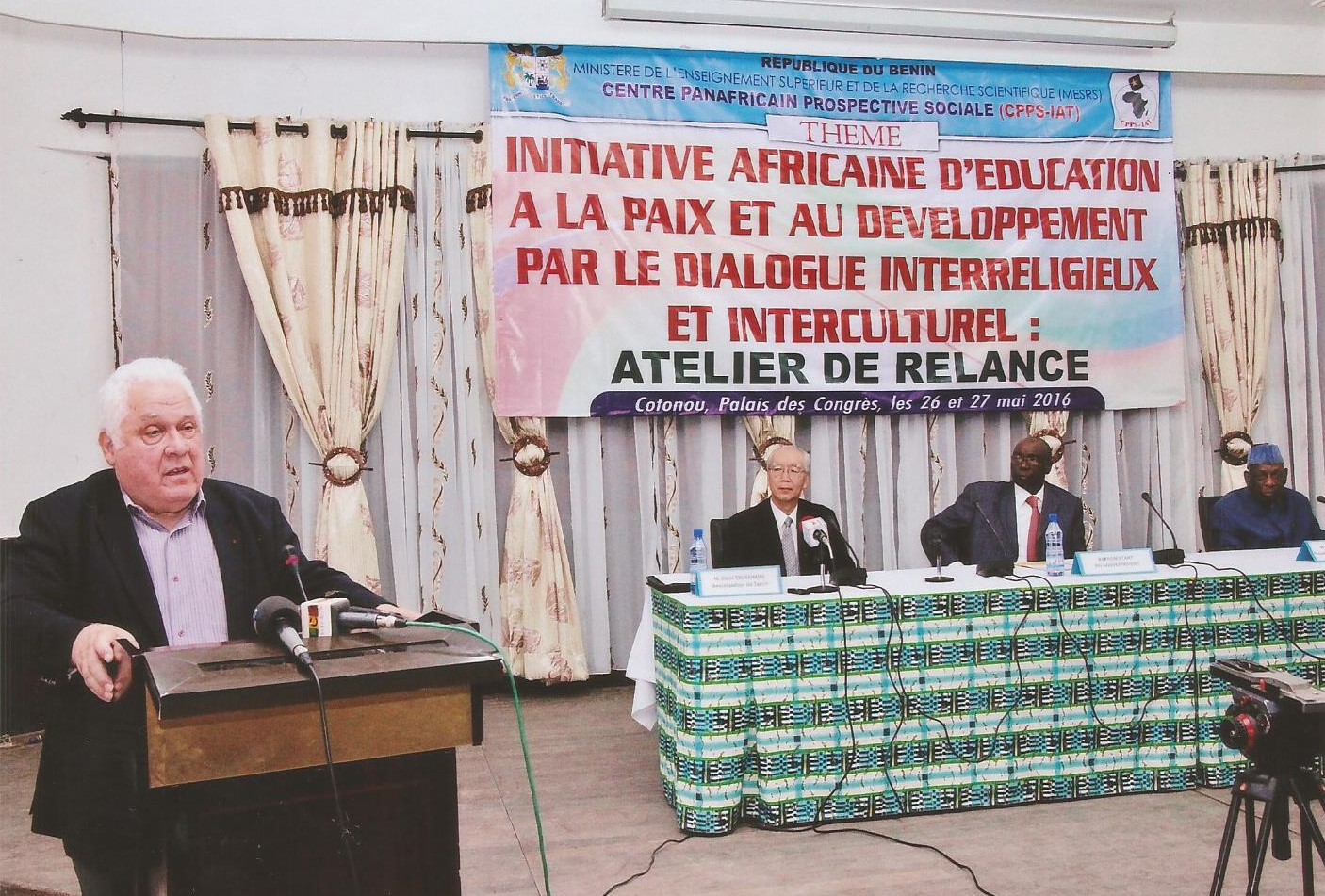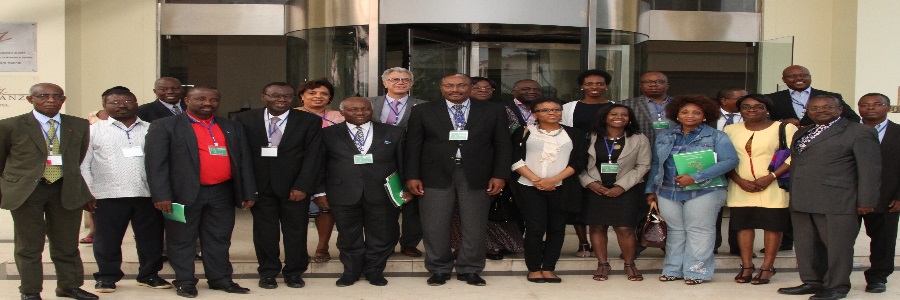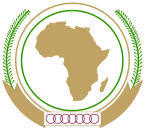-
Welcome to the
Network of Foundations and Research Institutions for the Promotion of a Culture of Peace in Africa
-
The Network's Meetings
News
CPNN (Culture of Peace News Network) newsletter of August 1, 2024
More voices of reason and hope
In this world that seems more troubled every day, on the battlefield, in the political arena and by global warming, we cannot have too many voices of reason and hope. The bulletin of May mentioned some of these. This month we add more voices.
Fifty winners of the Nobel Prize have issued an open letter calling for a truce during the Olympic Games in the wars being waged around the world, with mention of the Ukraine, Gaza and Yemen. “We are asking His Holiness Pope Francis, His Holiness the Ecumenical Patriarch Bartholomew, His Holiness the Dalai Lama XIV, and Muslim and Jewish leaders to use their moral authority to appeal to all citizens of the world and to their governments.”
Fifty organizations and individuals from Israel’s left and pro-peace camp sponsored a rally that drew thousands of Israelis to Tel Aviv with the message “It’s time to reach a deal. To stop the war. To make peace.” “Our mutual goal here is many different organizations and movement is to build together a peace camp in Israel,” said Alon-Lee Green, co-director of Standing Together, one of the groups that organized the conference.
The International Court of Justice has made a ruling with regard to the Israeli occupation of Palestine that is called “historic” by Human Rights Watch and Amnesty International. Amnesty concludes that “The international community, and in particular Israel’s allies, must now take unequivocal action to ensure Israel ends its unlawful occupation, starting with the immediate halting of the expansion of Israeli settlements and reversing the annexation of Palestinian territory, including East Jerusalem, and dismantling its brutal system of apartheid against Palestinians.”
With regard to the ongoing genocide in Gaza, the organization World Beyond War urges the United Nations General Assembly to use its Resolution 377 (Uniting For Peace) that allows them to act when the Security Council fails. “The General Assembly should NOT escalate the war or deploy armed troops. It should convene an emergency session and use “Uniting For Peace” to impose an arms embargo and targeted sanctions on the Israeli government, suspend the Israeli government from the United Nations, and send to Palestine unarmed peacekeepers (who have repeatedly shown their superiority to armed peacekeepers)”.
In fact, it is clear that the UN Security Council has failed its mission of preserving peace. In that regard, The Elders, a group founded by Nelson Mandela, has urged the UN to undertake a profound reform. “The Security Council, and in particular the veto power, must evolve if the UN system is to prove itself fit for purpose in the 21st century. We were encouraged by some of the innovative reform proposals we heard, and we hope that the Summit of the Future in September will be an opportunity to sow the seeds for lasting, positive change in the years ahead.”
The Summit of the Future is addressed in an article by Jeffrey Sachs, who heads up one of its planning networks. “The Summit of the Future is an invitation to intensive global brainstorming on how to make our deeply interconnected world fit for sustainable development in the 21st century. It is a great challenge that should be welcomed and joined by people all over the world. A great debate will open in September and then continue for years to come.”
With regard to sustainable development, United Nations Secretary-General Antonio Guterres has addressed the urgent need to protect billions around the world exposed to crippling effects of extreme heat. The appeal comes against the backdrop of record temperatures and deadly heatwaves – from the United States to Africa’s Sahel and Europe to the Middle East – that have killed several hundred people this summer. During the Hajj, for instance, scorching heat claimed over 1,300 pilgrim lives.
While UN reform is necessary, it is also necessary to develop the consciousness and actions that build pressure for peace from below. A leading role is played by the Campaign Nonviolence that will include thousands of actions for peace to take place from Sept 21 to Oct 2, 2024, (Int’l Day of Peace to Int’l Day of Nonviolence). Last year, people held over 5,000 actions, events, and marches across the USA and in 20 countries. Over 60,000 people participated in these events. “The Campaign Nonviolence Action Days are designed to bring together the many issues, movements, and efforts working to end violence and build a world that works for all of us.” In preparation for Campaign Nonviolence Action Days, they propose hundreds of training opportunities offered by dozens of partner organizations.
Twenty four years ago there was a powerful pressure for peace in the 75 million people who signed the Manifesto 2000 during the International Year for the Culture of Peace. Has the time come when we need a new manifesto, like the Manifesto 2025 proposed in our most recent blog?
| DISARMAMENT & SECURITY
Restore the Olympic peace: Over 50 Nobel laureates have written an open letter calling for a global ceasefire for the duration of the Paris Olympics |
HUMAN RIGHTS
World Court Condemns Israeli Apartheid |
SUSTAINABLE DEVELOPMENT
The Summit of the Future |
WOMEN’S EQUALITY
First Pan-African Conference on Girls’ and Women’s Education in Africa |
| TOLERANCE & SOLIDARITY
UNAOC Hosts Capacity-Building Workshop for the 7th edition of its Young Peacebuilders programme in Cáceres, Spain |
EDUCATION FOR PEACE
Campaign Nonviolence Action Days 2024 – Calls-To-Action |
DEMOCRATIC PARTICIPATION
US Labor Unions Call on Biden Administration to Immediately Halt All Military Aid to Israel |
FREE FLOW OF INFORMATION
The Elders: A message from Ernesto Zedillo, Former President of Mexico |
CPNN (Culture of Peace News Network) newsletter of May 1, 2024
Voices of reason and hope
In a world torn by war, intolerance and xenophobia, there are still important voices of reason and hope.
Speaking to the opening of the 37th African Union Summit, Lula da Silva, the President of Brazil, reaffirmed the partnership and bond between the country and people of Brazil and their sister continent of Africa: “The African struggle has a lot in common with the challenges faced by Brazil. More than half of the 200 million Brazilian citizens recognize themselves as Afro-descendants. We, Africans and Brazilians, must chart our own paths within the emerging world order. . . . Resuming Brazil’s rapprochement with Africa means recovering historical ties and contributing to the construction of a new, more just and supportive world order.”
Also in Africa, Senegal elected a new President, Bassirou Diomaye Faye, who is young and dynamic. In his first Presidential address to the nation, he promised “to reach out to everyone, to bring together, reassure, appease and reconcile, in order to consolidate the peace, security and stability essential to the economic and social development of our dear country” He recalled “our valiant resistance fighters, famous or unknown heroes, who, giving themselves body and soul, defied the odious colonial system and its so-called civilizing mission, to defend the freedom of our people and their values of culture and civilization.”
President Faye challenged his countrymen to take up “the historical responsibility to consolidate our sovereignty by breaking the chains of economic dependence,” through the “the construction of African integration and the achievement of the objectives of the Zone. of African continental free trade.”
In Europe and North America, there are eloquent political candidates who oppose the dominant political discourse of war and xenophobia.
In France, with the cry of “PEACE! PEACE! PEACE! That is our vote! Peace in Gaza! Recognition of the State of Palestine! Punishment of war criminals! Peace in Ukraine,” Jean-Luc Melanchon concluded his address to the opening of the campaign of Action Populaire for the June election to the European Parliament. He called for a force for peace “capable of engaging the new generation. That force is the people. We are the forward detachment. That force is a collective intelligence.”
Melanchon denounced the current policies of war: “War can produce nothing else except deaths, victims, desolation, destruction! War is the failure of the human condition. War is the failure of civilization. War! War will never produce anything other than war again! Always war, more war!”
In the United States there are good independent candidates, , although they are allowed very little media attention, in a Presidential campaign dominated by Biden and Trump. Independent candidate Cornel West says, “I want to raise my voice to mobilize people and get people to see that Trump is leading us toward second civil war and Biden is leading us to a third world war.”
West calls for disinvestment from the military: “62 cents for every one dollar in the discretionary budget in Washington goes to the military. We have 800 military units around the world and special operations in 130 countries. We have to cut back massively on military spending and put it directly into universal basic income.”
Jill Stein, who seeks to be the Green Party candidate for President, also calls for disinvestment from the miitary: “We are spending $12,000 this year maintaining forever wars in the Forever War Machine—$12,000 per household—in our tax base.” She says that “these funds could be more effectively used to address domestic issues.” Stein focuses her campaign on the Green Party’s core principles of environmental sustainability, social justice and a commitment to nonviolence.
Also in the United States, there is a renewed mobilization of trade union activism led by the dynamic President of the United Auto Workers, Shawn Fain. Speaking to autoworkers seeking to unionize the Mercedes-Benz factory in Alabama, Fain said “Working class people, like all of you here today, have the power to change the world. You have the power to change your circumstances. You have the power to take back your time. To take back your life. To win real time off the job. A fair wage. Good healthcare you can afford. A better life for your family. For all of Alabama. . . . Without a Union contract, they have all the control. You have the power. You just have to recognize it and use it. Let’s finish the job that started so long ago. Let’s walk a new path for working-class people together in solidarity.”
On a global level, Mary Robinson delivered the keynote address to the assembly of the Inter-Parliamentary Union. She is the President of The Elders, a group of independent global leaders founded by Nelson Mandela who work for peace, human rights and a sustainable planet. She told the parliamentarians: “The Elders are calling for long-view leadership to tackle existential threats and to build a more resilient and equal society. Long-view leadership means showing the determination to resolve intractable problems, not just manage them. The wisdom to make decisions based on scientific evidence and reason and the humility to listen to all of those affected.”
Finally, the speech by Nobel Peace Laureate Shirin Ebadi on International Women’s Day decried the lack of women’s equality everywhere in the world, and especially the worst cases of Israel and Palestine, Iran and Afghanistan. She expressed the conclusion of last month’s CPNN bulletin and blog that Insofar as women take leadership, we have a greater chance that coming changes will lead to a culture of peace,
And In this month’s blog, we write that the leadership shown by Lula and Faye give hope that perhaps democracy can survive in Africa and Latin America by gaining freedom from the control of the grand capitalists that rule in Europe and North America.
| FREE FLOW OF INFORMATION
Speech by Brazil President Lula at the opening of the 37th African Union Summit |
HUMAN RIGHTS
Amnesty International: Julian Assange’s five-year imprisonment in the UK is unacceptable |
SUSTAINABLE DEVELOPMENT
Youth Lead Global Strike Demanding ‘Climate Justice Now’ |
WOMEN’S EQUALITY
Dr. Shirin Ebadi Speech In Paris on International Women’s Day |
| DISARMAMENT & SECURITY
UN Security Council Holds Rare Nuclear Disarmament Debate |
EDUCATION FOR PEACE
Colombia: The first meeting is held in Cali to weave a network of peace initiatives in the territories |
TOLERANCE & SOLIDARITY
Pro-Palestinian protests and encampments sweep campuses of major universities across the United States |
DEMOCRATIC PARTICIPATION
First message to the nation from President Bassirou Diomaye Faye – on the eve of Senegal’s independence day |
CPNN (Culture of Peace News Network) newsletter of April 1, 2024
International Women’s Day around the World
Celebrations and protests marked International Women’s Day around the world on March 8.
CPNN carried photos from many of the these events.
In Europe, they came from Albania, Belgium, England, France, Germany, Greece, Italy, Kosovo, Latvia, Malta, Montenegro, Netherlands, Portugal, Romania, Russia, Serbia, Spain and Ukraine.
In Asia and the Pacific, from Afghanistan, Australia, Bangladesh, Cambodia, China, India, Indonesia, Japan, Kazakhstan, Kyrgyzstan, Malaysia, North Korea, Pakistan, Philippines, South Korea, Thailand and Vietnam.
In Africa and the Middle East, from Algeria, Azerbaijan, Cameroon, Côte D’Ivoire, Democratic Republic of Congo, Iraq, Israel, Kenya, Lebanon, Mali, Morocco, Palestine, Senegal, South Africa, Tunisia, Turkey and Uganda.
In the Americas, from Argentina, Bermuda, Bolivia, Brazil, Canada, Chile, Colombia, Ecuador, Guatemala, Honduras, Mexico, Panama, Peru, Puerto Rico, United Nations, United States and Venezuela.
In the capitalist countries, the events were mostly protests and demands for women’s rights in the face of widespread discrimination and violence against women, including criminal prosecution for abortion. Many events condemned in particular the violence against women in Palestine and Israel in recent months.
In many of the socialist and former socialist countries, the events were celebrations rather than protests. This was the case in Russia, China, Kyrgyzstan, North Korea, Cambodia, and Vietnam. this reflects the history of the day, which was initiated by socialist organizations at the beginning of the last century, and then celebrated primarily by the socialist movement and communist countries until its adoption by the United Nations in 1977.
This year the United Nations celebrated the Day with the slogan “Invest in women to accelerate progress.” They criticized an “alarming lack of financing” for achieving gender equality: “Feminist organizations are leading efforts to tackle women’s poverty and inequality. However, they are running on empty, receiving a meagre 0.13 per cent of total official development assistance.”
The Women’s International League for Peace and Freedom, founded to oppose World War I, and boasting the Nobel Peace Prize to two of its founding members, dedicated their celebration of the day to solidarity with the people of Palestine, concluding that “the world sees Gaza as a global front against the rule of oppression, colonialism, and tyranny, so they act in solidarity with Gazans and for justice for all including themselves.”
The organization, The Warriors of Peace, also condemned the violence against women in israel and Palestine, and added reference to violence against women in many other regions of the world. They wrote that “This International Women’s Day has a special flavor. We know to what extent wars and conflicts can destroy struggles and weaken achievements. We, The Warriors of Peace, are convinced that women, when they unite, form the most powerful shield against the destruction of the world. We are the resistance. We are the ones who hold on, who stay standing . . . Feminism is justice, equality and dignity for all. It is the refusal of assignment and division. Feminism is peace.”
As discussed in the blog this month, “we are entering an era of economic and political contradictions that will lead to revolutionary change. Insofar as women take leadership, we have a greater chance that the change will lead to a culture of peace.”
| WOMEN’S EQUALITY
International Women’s Day: Asia/Pacific |
HUMAN RIGHTS
South Africa requests ICJ emergency orders to halt “unspeakable” Gazan genocide |
SUSTAINABLE DEVELOPMENT
Greta Thunberg, 40+ Other Climate Activists Block Entrance to Swedish Parliament |
FREE FLOW OF INFORMATION
Peace Wave 2024 |
| DISARMAMENT & SECURITY
Kremlin, NATO at odds over pope’s call for Ukraine to show ‘white flag’ and start talks |
EDUCATION FOR PEACE
FIJCA 2024: JAZZ as an instrument of social cohesion in Ivory Coast |
TOLERANCE & SOLIDARITY
Search for Common Ground in Israel and Palestine |
DEMOCRATIC PARTICIPATION
France: Speech by Jean-Luc Melanchon on the force of action for peace |
CPNN (Culture of Peace News Network) newsletter of November 1, 2023
Solidarity with Gaza
“We’re watching a genocide unfold in real-time. In just three weeks, the Israeli military has killed over 8,000 Palestinians in Gaza, among them over 3,000 children,” Jewish Voice for Peace (JVP) said early Monday (October 30). “That’s more than the annual number of children killed in conflicts across the globe since 2019.” According to the United Nations, as of October 26, at least 45% of housing units have been destroyed or damaged.
Photos
The Network Meetings
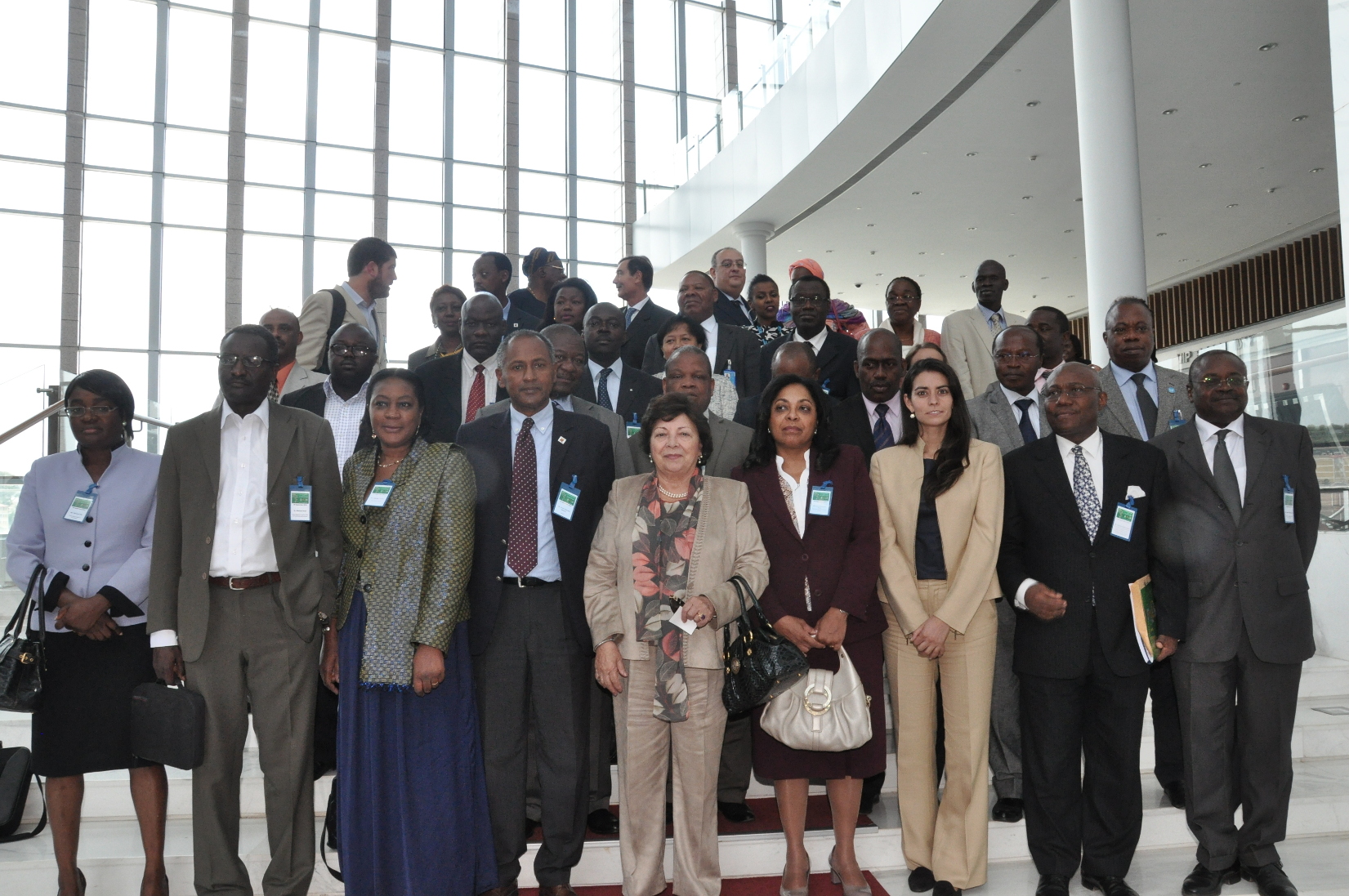
Links
FESA-UNESCO International Conference, December 12-13, 2016, Luena, Angola
Third Meeting of the Network September 11-12, 2015 in Soyo, Angola
Second Meeting of the Network, from September 21 to 24, 2014 in Yamoussoukro, Côte d'Ivoire
Network Creation Meeting on September 20, 2013 in Addis Ababa, Ethiopia
Text Resources
- Call for Papers HARIS 2 JUNE 2021
- Report of the 5th Meeting of Members of the Network held on 21 September 2019 in Angola on the sidelines of the Luanda 2019 Biennale for the Culture of Peace
- Activity Report 2019
- Program of the Luanda Biennale
- DRC the six-day war in Kisangani
- Insecurity in the Masisi in Eastern DR Congo
- General Report of the Houphouet Boigny Foundation International Conference, October 20, 2018
- RAPPORT FINAL DE LA CONFERENCE FESA-UNESCO SUR LE THEME "PREVENTION DES VIOLENCES ET PROMOTION DE LA CULTURE DE LA PAIX EN PERIODE ELECTORALE EN AFRIQUE" LES 12 ET 13 DECEMBRE 2016 A LUENA EN ANGOLA
- BULLETIN DE L’UNION AFRICAINE (UA) ET DE LA CORNE DE L’AFRIQUE (HOA) du 1er juin au 31 Août 2017
- LES STATUTS DU RÉSEAU
- RAPPORT D'ACTIVITÉS 2014 - 2015 DU RÉSEAU
- RAPPORT D'ACTIVITÉS 2015 - 2016 DU RÉSEAU
Welcoming Remarks
You are welcome to visit the website of the Network of Foundations and Research Institutions for the Promotion of a Culture of Peace in Africa.
The Network was created at the end of the Addis Ababa meeting on September 20 and 21, 2013 with a view to "creating a continental and sustainable peace movement capable of mobilizing African States, the private sector, African artists and leaders, international organizations and regional development actors as well as NGOs and grassroots associations". It is currently composed of 44 African and non-African organizations listed here.
You will find on our website articles, publications, photos and videos concerning the promotion of the Culture of Peace on the African continent. We also keep you informed about upcoming events.
